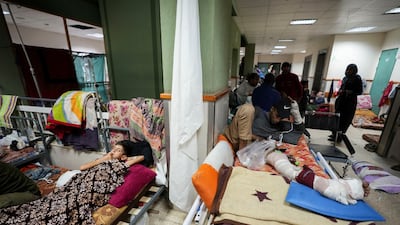Live updates: Follow the latest news on Israel-Gaza
The head of the World Health Organisation said he received “troubling” reports of new evacuation orders near Al Aqsa Martyrs' Hospital, with more than 600 patients and health workers forced to leave the hospital in central Gaza.
Israeli troops “forced over 600 patients and most health workers to leave” the hospital in central Gaza, WHO director general Dr Tedros Adhanom Ghebreyesus said on X.
“Their locations are not currently known,” he said, warning that the hospital had “immense needs” following a UN visit to the complex in Deir Al Balah on Sunday.
According to Gaza's Health Ministry, 73 people were killed in the past 24 hours. About 100 others are believed to have been taken to the hospital in the past day.
On Sunday, the ministry said Israeli drones opened fire on buildings at Al Aqsa Martyrs' Hospital.
“At Al Aqsa, WHO staff saw sickening scenes of people of all ages being treated on blood-streaked floors and in chaotic corridors … Other injured were prostrate on the floor, being stepped over by the health staff and families,” Dr Tedros said, calling for the “bloodbath” in Gaza to end.
Several international organisations have withdrawn their staff from the hospital “due to increasing military activity” around the complex, Dr Tedros said.
These include the Emergency Medical Team ran by Medical Aid for Palestinians and the International Rescue Committee (IRC).
MAP said one of its staff members is a patient at the hospital who was injured in an Israeli attack.
“Several of her close relatives, including three of her sisters, were killed in the strike,” the organisation said.
“The amount of injuries being brought in over the last few days has been horrific and with a huge reduction in the number of staff able to come to the hospital there is even less capacity for treating them," said Prof Nick Maynard, a surgeon and clinical lead for the emergency medical team, in an IRC statement.
“There are patients clearly dying in the emergency department who could be saved if there were enough staff."
In the same statement, the organisations repeated their call for hospitals to be protected.
"The dismantling of health services witnessed in the north must not be repeated in the middle and south of Gaza," they said.
Several health professionals have been injured when working to treat the wounded, with strikes and attacks on hospitals characterising the darkest episodes of the war so far.
Ayman Nasser, a veteran paramedic who has worked in Gaza since 2004 was injured when responding to distress calls following an Israeli strike in Al Nuseirat. He was transferred to Al Aqsa Hospital.
“I was unconscious. When I woke up, I found myself in the hospital and doctors told me that they needed to amputate my right leg,” he told The National.
“It was a difficult decision to give them my approval. I wondered if I would have the ability to work again.” He has since suffered from serious complications in his amputated leg. There has been a reported rise in post-amputation infections due to a lack of hygiene and proper resources to keep wounds clean.
“I need to get proper treatment which is not available here. I could lose my second leg due to nerve damage,” Mr Nasser said. He hopes to learn how to walk again using a prosthetic leg.
“All I want is to go back to work and rescue my people.”

Health workers under attack
Naseem Hassan, a paramedic officer in the ambulance and emergency unit in the health ministry, said his unit faces difficulties in their rescue operations at Al Nasser Hospital in southern Gaza.
“We worry all the time that our ambulances will be targeted,” he told The National, adding that members of other teams have been hit by Israeli strikes. There is such a high number of casualties, that sometimes civilians help paramedic crew in transferring the injured, he said.
Another paramedic working in the city of Rafah on the border with Egypt was injured when Israeli forces opened fire at his team while attempting to rescue a young boy.
“I managed to flee the area as my colleagues were unable to reach me for evacuation due to the intense gunfire.” Mohammed Radwan told The National.
“I ran for approximately 1km while bleeding until I found another ambulance to transport me.”
He was unable to rescue the young boy. Mr Radwan also said his injuries have limited his ability to perform his duties.
“All I ask for is to be able to work safely and be protected under international law.”

